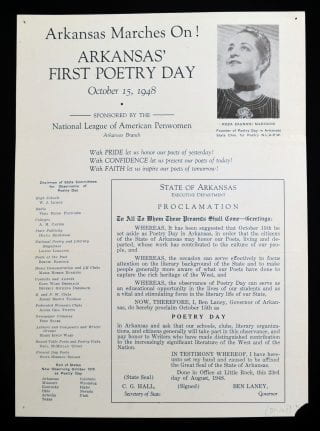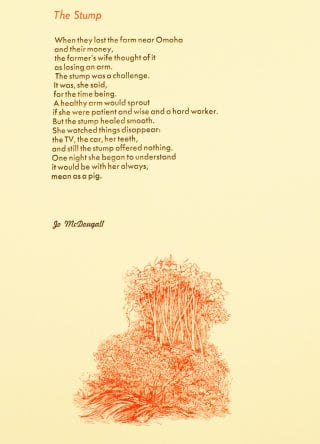This blog is by Emily Snyder, an Honors College student who served as a Special Collections intern during the Summer 2020. Her internship included digital collection description, development of research guides, and independent research. Because of limited access to the collections due to the COVID-19 pandemic and campus safety protocols, Snyder staged her research for this piece over months, even after her internship concluded.
Women’s contributions to literature and poetry have often been unnoticed or ignored, their distinct worldviews and experiences sidelined. In spite of this, many female poets within Arkansas have gained recognition for their exceptional work. Women throughout Arkansas’ history have carved a space to express themselves through poetry, by way of both organizations to promote their literature and artistic expression and by their individual work that has established them as notable literary figures.
The position of Arkansas poet laureate has been held by a woman five out of the six times it has been presented, only going to a man at its creation in 1923. A poet laureate is someone who is appointed to the post by the governor because of their particular skill in writing or fame from their work and is meant to foster a deeper awareness and admiration for poetry. The following five women fit this criterion and established themselves as forces in their field.
Rosa Zagnoni Marinoni was the first female Arkansas poet laureate, appointed after the death of the first poet laureate, Charles T. Davis. She held this title from 1953 to 1970. Marinoni was a prolific writer, having written over one thousand short stories, over nine hundred poems, and nineteen books. But beyond her own literary abilities, she was also incredibly important because of her promotion of poetry, other poets, and the state of Arkansas. (See the Encyclopedia of Arkansas article on Marinoni for more information.) She began a University-City Poetry Club in Fayetteville and created a community where new writers could learn and develop. She also founded a branch in northwest Arkansas for the National League of American Pen Women (NLAPW), which became an active organization where women could cultivate their creative passions with their female colleagues. Marinoni and the NLAPW created Arkansas’ Poetry Day, first celebrated on October 15th, 1948 to further promote appreciation for poetry and poets in the state. That day is still commemorated on the third Saturday of October, and the 73rd Poetry Day was celebrated this year. To commemorate her great impact on the promotion of poetry in Arkansas, October 15th was named Rosa Zagnoni Marinoni Day in 1969.

Lily Peter was the third poet laureate of Arkansas, bearing the title from 1971 to her death in 1991. Peter was known for many things besides being a poet laureate, such as her philanthropy work to bring fine arts to the state of Arkansas and to pay for college tuition for many people. She was also a very successful farmer, and went to Columbia and Vanderbilt to study English, as well as Juilliard to study violin. Peter was also a writer of many manuscripts, where she most often wrote about the Arkansas Delta.
Verna Lee Hinegardner became the poet laureate in 1991, staying in the position until 2003. Hinegardner wrote throughout her life, was involved in many organizations for the promotion of poetry and won many awards. She was an original member of the Poets’ Roundtable of Arkansas’ Hot Springs branch, president of the Arkansas NLAPW, participated in Arkansas Poetry Day, even serving as the contest chairman in its sixtieth year, and was inaugurated into the Arkansas Writers’ Hall of Fame in 1991. In her lifetime, she published twelve collections of poems, while also being published in various other anthologies and magazines and editing a poetry column in her local newspaper for twenty-two years. She created a new poetry style, called the “minute.” Her great abilities and impact on Arkansas poetry can easily be seen in her abundant activities and accolades.
Peggy Sue Caudle Vining was another poet laureate who was active in poetry organizations and won many awards. She held the post of laureate from 2003 to 2017. Vining became a member of the Poets’ Roundtable of Arkansas (PRA) in 1963 and began being published, first in the PRA anthology of that year and newspaper columns. She was also a teacher for many years, but after retiring, spent more time on her poetry. She was president of the PRA three times, was president of the Arkansas Pen Women and Arkansas Songwriters Association, and was the director of the Ozark Creative Writers, Inc. Conference for twelve years and the Arkansas Writers’ Conference for two years. She gained great acclaim for her poem, “Arkansas, The Natural State,” and was given a lifetime achievement award from the Arkansas Arts Council. Outside of literature, she was granted the title Arkansas Mother of the Year Award in 1982 by the organization American Mothers, Inc. and was given the Point of Light Award by President George H. W. Bush. Her achievements in poetry and beyond are a great honor to Arkansas.
Jo Garot McDougall is the current Arkansas poet laureate, a position she has held since 2018. McDougall is the author of eight books, much of which is influenced by her life in the Arkansas Delta, and is involved in the PRA. She has won many awards, including a fellowship granted by the Arkansas Arts Council, the Porter Prize, the Porter Fund Lifetime Achievement Award, the Pushcart Prize, and is in the Arkansas Writers’ Hall of Fame. Her work has been adapted and used in various other mediums, including a short film, a stage presentation, songs, and exhibits. Best of all, she is a University of Arkansas alumni.

Finally, it would be remiss to not mention the incredible poet Maya Angelou. Though never officially named poet laureate of Arkansas, Angelou’s impact on poetry, culture, and society in general cannot be overstated. She was a great author, performer, and activist for African Americans and women. Her critically renowned book I Know Why the Caged Bird Sings discusses her time living in Arkansas during her childhood. In 1993, she was among the first to be inducted into the Arkansas Black Hall of Fame. She was sought after for public appearances and read her poetry at many important events, including President Bill Clinton’s inauguration. She also spoke at the 1976 Poetry Day in Arkansas, which was the first time she had returned to Arkansas since she was a child. She received many honorary degrees and awards, notably the National Medal of Arts and the Presidential Medal of Freedom.
Besides the admirable women laureates, poetry in Arkansas has been furthered by many women who formed and continued organizations established to support poetry and poets in Arkansas. Two organizations in particular, the Poets’ Roundtable of Arkansas (PRA) and the Arkansas Branch of the National League of American Pen Women (NLAPW), have women of Arkansas to thank for their existence. The NLAPW was founded in 1897 to advance the creation of artistic endeavors and encourage women in these. The Arkansas Branch was founded in 1920 by Bernie Babcock, who served as the first president. In 1944, the branch initiated the Arkansas Writers’ Conference, and later the Arkansas Writers’ Hall of Fame. In present day, the Arkansas Pioneer Branch is still active and two other Arkansas branches have been added, the Northwest Arkansas and Spring River Branches. The PRA, despite being open to any gender, was established in 1931 by a group of seven women who wanted to learn the technical rules of poetry. The society’s purpose is to support poets and foster a greater appreciation for poetry and poets in Arkansas. All of the Arkansas poet laureates have been participants in PRA. The organization is still operating and publishes an anthology of PRA members’ poems each year.
The work of female poets in Arkansas is extensive and awe-inspiring. They have worked to establish themselves and support each other in their literary endeavors. By doing so, they have fashioned a position for themselves in the literary history of the state and our nation at large, motivating young women and girls to follow in their footsteps and insert themselves in the world of poetry.
Further Information:
Rosa Zagnoni Marinoni: Poet and Arkansas Advocate: https://libraries.uark.edu/info/exhibitgallery.asp?ExhibitID=268
Poetry Day Broadside: https://uark.as.atlas-sys.com/repositories/2/resources/1676
National League of American Pen Women, Northwest Arkansas Branch Records: https://uark.as.atlas-sys.com/repositories/2/resources/447
Maggie Smith Aldridge Collection Addendum: https://uark.as.atlas-sys.com/repositories/2/resources/676
The Lost Roads Project: https://uark.as.atlas-sys.com/repositories/2/resources/330
Lily Peter Interview: https://uark.as.atlas-sys.com/repositories/2/resources/1734
Bibliography:
Encyclopedia of Arkansas, 2019, encyclopediaofarkansas.net/.
